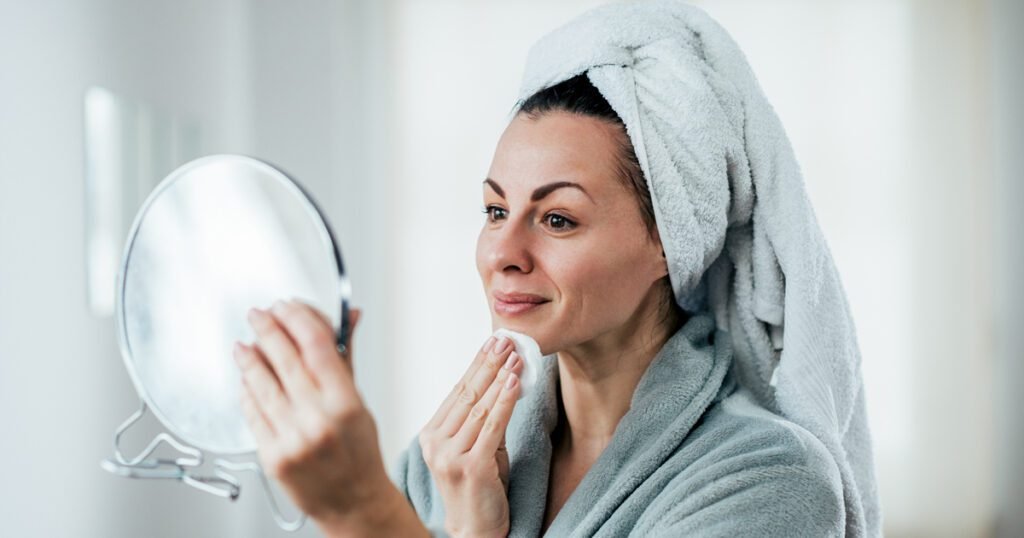The Rise of Apple Cider Vinegar: Is It a Beauty Elixir or Just Another Fad?
Apple cider vinegar (ACV) has recently surged in popularity across social media platforms as a go-to wellness elixir. Users are not just sipping this tangy liquid; they’re also integrating it into their beauty routines, seeking benefits for skin and hair. But how effective and safe is ACV for these purposes? Here, we delve into the facts and offer insights from credible dermatological sources.
What Is Apple Cider Vinegar?
Apple cider vinegar is created through a multi-step fermentation process of apple juice. The steps are as follows:
- Crushing Apples: Fresh apples are crushed and mixed with yeast.
- Fermentation: Natural bacteria work to convert the alcohol produced during the initial fermentation into acetic acid.
- Final Form: ACV can be found in either pasteurized and filtered form or in raw, unfiltered form, the latter of which retains a cloudy sediment composed of beneficial bacteria and yeast.
Understanding the Claims Surrounding ACV
ACV is not a modern discovery; its uses can be traced back centuries for a range of conditions—everything from soothing acid reflux to aiding in weight loss. While ACV-infused beauty products are increasingly common on store shelves, substantial scientific evidence supporting these claims is lacking. As Dr. Ronald Sulewski, a dermatologist at Nebraska Medicine, states, “It’s not a magic topical and not one I would necessarily recommend.”
If you’re in generally good health and interested in trying ACV, moderation is key. Dr. Sulewski advises, “For those who have incorporated it into their routine without irritation, there don’t seem to be significant downsides.”
How to Safely Use Apple Cider Vinegar on Hair and Skin
Before diving into using ACV, it’s crucial to understand that it’s highly acidic. To ensure safety and effectiveness, always dilute it. Here’s a simple guide:
- Dilution Ratio: Mix 1 tablespoon of ACV with every 8 ounces of water.
- Gradual Strengthening: Based on your hair and skin’s reaction, you can gradually increase the concentration, but avoid excessive use to prevent adverse effects.
Potential Benefits of ACV for Beauty
Advocates of ACV often highlight its benefits for hair and skin:
For Hair:
- Cleansing of product and oil buildup
- Enhancing shine and protecting color
- Adding volume and relieving scalp itchiness
- Potentially encouraging hair growth
For Skin:
- Balancing skin pH
- Promoting exfoliation
- Reducing hyperpigmentation
- Stimulating circulation
Caution for Those with Skin Conditions
If you suffer from any medical skin conditions, it’s advisable to consult with a dermatologist before using ACV. Improper use may exacerbate the problem or lead to unwanted side effects.
Expert Tips for Using Apple Cider Vinegar
- Avoid Use If Symptoms Arise: Cease use immediately if you experience any irritation.
- Research Before Application: Utilize reputable websites for instructions and methods.
- Consider Seasonal Variations: ACV may be less effective during winter months when skin tends to be drier.
- Moisturization Is Crucial: Always keep your skin well-moisturized.
- Sun Sensitivity: ACV can increase skin sensitivity to sunlight, so continuous use of sunscreen is vital.
- Patch Test: Perform a skin patch test on a small area before applying ACV more broadly.
Conclusion
While the allure of apple cider vinegar as a beauty treatment continues to grow, it’s essential to prioritize safety and consult professionals if you have specific skin conditions. The potential benefits of ACV could enrich your beauty routine, but ensuring proper use will safeguard your skin and hair against irritation.
For more insight on natural beauty treatments and their efficacy, explore reputable sources and dermatological advice. Always remember that moderation and awareness are your best tools in your beauty arsenal.


